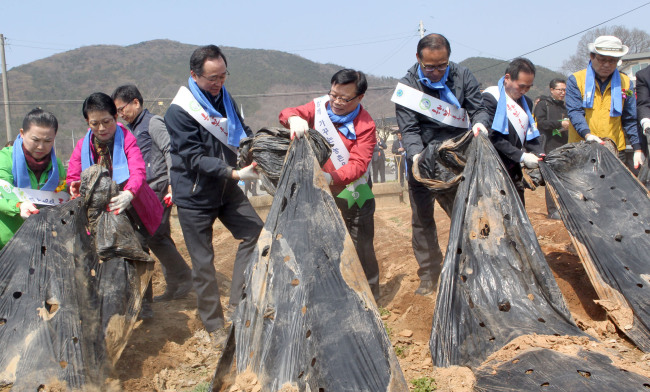Plastic waste is causing environmental hazards in agricultural towns in the Korean countryside, as more than half of the waste is abandoned in empty fields, data showed Thursday.
In the winter, those in farming villages wrap greenhouses with plastic to prevent crops such as peppers, onions and garlic from freezing. The plastic also works as a protection from weeds.
Despite serious environmental issues such as soil pollution, the number of farmers abandoning used sheets of plastic on the ground have been consistently high.
“Although plastic sheets used among farmers here are mostly made of polyethylene, which is less harmful and does not release dioxine, it still hampers the growth of crops since it can block waterways underneath the ground, and plus, the plastic film is nonbiodegradable,” said an official at North Jeolla Province‘s environment and livestock deparment.
 |
Local government officials collect abandoned vinyl waste in a field in a rural town in North Jeolla Province. Yonhap |
According to Korea Environment Corp., a unit which runs a plastic waste collection service, a total of 180,000 tons of plastic waste were collected in 2014, slightly more than half of the total amount of used plastic nationwide that year.
The amount of collected plastic waste has been steadily increasing, though it is still far less than the amount produced, data showed.
By province, Gangwon Province collected 23,400 tons of plastic waste in 2015, up 14 percent from the 20,430 tons collected in 2013.
North Gyeongsang Province saw a 25 percent increase in plastic waste, collecting 34,728 tons of it in 2015 compared to 25,919 tons in 2013.
Korea Environment Corp. cited as the reason the lack of recycling centers in rural towns, which makes it more difficult for residents to gather and remove plastic waste.
As of 2015, there were 320 recycling centers in rural towns in North Gyeongsang Province, while 328 more will be added by the end of the year, according to the province.
North Jeolla Province is also adding 34 more recycling centers to its current 93.
Analysts said the local governments’ budget constraints also hampers the collection of plastic waste.
“The government should distribute more of the budget to local government offices to run plastic waste collecting services, since with the current amount of collected plastic waste, the recycling process costs more than the collected waste itself,” professor Lee Hak-seong from the University of Ulsan told The Korea Herald.
“Residents should be informed of the reasons why used plastic should be disposed of at designated recycling centers, and what it does to land when left on the ground,” he added.
By Kim Da-sol (
ddd@heraldcorp.com)








![[Today’s K-pop] Blackpink’s Jennie, Lisa invited to Coachella as solo acts](http://res.heraldm.com/phpwas/restmb_idxmake.php?idx=644&simg=/content/image/2024/11/21/20241121050099_0.jpg)